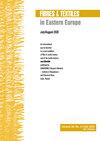亚洲女性运动时乳房垂直移位:胸罩类型、大小和乳房不同部位的影响
IF 0.9
4区 工程技术
Q3 MATERIALS SCIENCE, TEXTILES
引用次数: 1
摘要
亚洲女性的乳房尺寸较小,乳房密度较大,因此需要对其乳房运动学和生物力学进行专门的研究。为了研究亚洲女性在跳绳、散步、慢跑、跑步等运动方式下,在不同支撑条件下(穿着日常文胸或运动文胸)乳房垂直位移情况,并评估乳房不同部位之间的运动情况,本研究选择了7名参与者。在她们的左乳房上分别放置5个红外标记,并使用三维运动捕捉系统(NDI Optotrak调查员)收集行走(5 km/h)、慢跑(7.5 km/h)、跑步(10 km/h)和跳绳(2 Hz)时乳房垂直位移的数据。两种胸罩情况下,乳房不同部位的垂直位移无显著差异。跳绳、慢跑和跑步在乳房垂直位移上也存在显著差异。乳房大小对其垂直位移没有显著影响。更小、密度更大的乳房似乎达到了垂直位移的阈值,这与高强度的动态运动(慢跑、跑步和跳绳)相似。研究结果可能有助于为亚洲小胸女性或跳绳运动员设计特殊的运动胸罩,以提高其减震功能。本文章由计算机程序翻译,如有差异,请以英文原文为准。
Vertical Breast Displacement in Asian Women During Exercise: influence of Bra Type, Size and Different Parts of the Breast
Abstract Asian women have smaller breast sizes and greater breast density, which suggests specific research on their breast kinematics and biomechanics. To investigate vertical breast displacement of Asian women among exercise modalities (rope skipping, walking, jogging, running) in different support conditions (wearing everyday bra or sports bra), and assess the motion between different parts of the breast, seven participants were selected to participate in this study. Five infrared markers were placed on each of their left breasts, and a three-dimensional motion capture system (NDI Optotrak Investigator) was used to collect the data on vertical breast displacement during walking (5 km/h), jogging (7.5 km/h), running (10 km/h) and rope skipping (2 Hz). No significant difference was found in the vertical displacement of different parts of the breast in the two bra conditions. Also, there was significant difference in vertical breast displacement among rope skipping, jogging and running. Breast size did not significantly affect its vertical displacement. The smaller, denser breast appears to reach a threshold of vertical displacement that is similar at high severities of dynamic exercises (jogging, running and rope skipping). The results might be useful for designing special sports bras for Asian women with small breasts or rope skipping participants to improve the shock absorption function.
求助全文
通过发布文献求助,成功后即可免费获取论文全文。
去求助
来源期刊

Fibres & Textiles in Eastern Europe
工程技术-材料科学:纺织
CiteScore
1.60
自引率
11.10%
发文量
12
审稿时长
13.5 months
期刊介绍:
FIBRES & TEXTILES in Eastern Europe is a peer reviewed bimonthly scientific journal devoted to current problems of fibre, textile and fibrous products’ science as well as general economic problems of textile industry worldwide. The content of the journal is available online as free open access.
FIBRES & TEXTILES in Eastern Europe constitutes a forum for the exchange of information and the establishment of mutual contact for cooperation between scientific centres, as well as between science and industry.
 求助内容:
求助内容: 应助结果提醒方式:
应助结果提醒方式:


